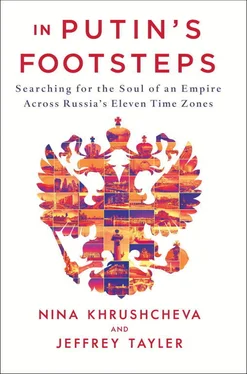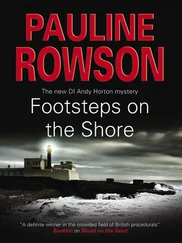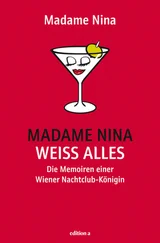A Soviet war trophy of sorts, the Kaliningrad Oblast was, oddly, never formally transferred to the communist government; although Germany has never officially demanded its return, it has never renounced it, either. Perhaps, because of this, the fear of “re-Germanization” looms. Today, the Kremlin uses the exclave’s very ambiguity to ratchet up anti-Western rhetoric.
But what does the fear of “re-Germanization” mean, exactly? Germanization in Kaliningrad—as understood by Russians—is the belief that Germany is eager to relocate ethnic Germans back to Kaliningrad, actively and aggressively infusing the territory with German culture. If such were to occur, it would surely be as bad as the Nazi occupation, the state insists. This fear of “re-Germanization” isn’t novel; it was a constant undercurrent in Kaliningrad’s Soviet history. And even though people here frequently travel to the Baltics, Poland, and Germany on long-term Schengen visas and witness little evidence of this “threat” while there, in a country where the state is so imposing, how does one disregard the propaganda? The Western menace is often discussed on television and the harrowing memory of Nazism is never allowed to quite fade into historical oblivion. And, the argument goes, just about the only thing protecting the country from this threat is Putin.
The next day was rainy and cool—typical Baltic weather. Maxim, the enterprising, thirtysomething son of a Moscow acquaintance of ours, kindly offered to give us a tour of the city and the surrounding towns. We drove out in his slick black Audi through morning traffic into the rain-sodden fields and forests of the countryside, briefly stopping at the military hamlet of Pionersky, our first encounter with Putin’s specter on this trip. Rumor has it that the Russian president, who visits frequently, stays in a villa behind a tall green wall. We also dropped in on Svetlogorsk, an up-and-coming resort hardly renowned during the Soviet era. Then, the Soviets boasted of Latvia as their major Baltic vacation spot.
Maxim had previously worked as an engineer in the ports of Kaliningrad and Baltiysk (formerly the German town of Pillau) but now finds himself employed by the Chinese, preparing their soybean oil containers for shipping. These two ports shelter Russia’s Baltic fleet and have, since the Soviet era, formed the epicenter of the region’s military-oriented economy. Maxim told us that he was disappointed to have lost his state-related job recently owing to the Kremlin’s shift of resources toward the Crimean Peninsula.
Crimea—in 988 it became the cradle of Orthodox Christianity for Kievan Rus, the original protostate for both Russia and Ukraine—had been officially Russian since 1783, when Empress Catherine the Great seized it from the Crimean Khanate, then a vassal state of the Ottoman Empire. In the Soviet Union Crimea remained under the Kremlin’s jurisdiction, but in 1954 Nikita Khrushchev, who succeeded Joseph Stalin after his death, transferred it to Ukraine, which was, just like Russia, one of fifteen Soviet Republics within one country, the Union of Soviet Socialist Republics (USSR). There were many reasons for that transfer, administrative and economic, but uppermost was the desire to overcome Stalin’s legacy of central control. Khrushchev thought of Ukraine and Russia as equal nations; he assigned historical primacy to ninth-century Kiev, not to Moscow, which until the 1100s was just an obscure village in the woods.
But following the Euromaidan protest movement in Kiev that led to the 2014 overthrow of Ukrainian president Viktor Yanukovych, a Putin ally, Russia annexed Crimea with a stealth invasion. Announcing the annexation in March 2014, Putin insisted that “in people’s hearts and minds, Crimea has always been an inseparable part of Russia.” [9] 1 This and the following quote are from “Transcript: Putin Says Russia Will Protect the Rights of Russians Abroad,” Washington Post , March 18, 2014.
He thereby vilified Khrushchev—by whose action Russia was not “simply robbed, it was plundered.” The speech set up a dichotomy that now stands at the core of Russian identity: strong-hand rulers like Putin or Stalin—those who collect Russian lands—standing against reformers like Khrushchev or Mikhail Gorbachev, who give them away. Kievan Rus, too, was eventually torn apart—Great Russia versus Small Russia (“Malorossiya,” an old Russian name for Ukraine).
Arguing that for sixty years the Crimean dream has been to return under the wings of Mother Russia, the Kremlin had to deliver on its promise to improve life on the peninsula. The minimum monthly cost of living on the peninsula has been around 14,000 rubles ($240), which is more than half the average salary and 10 percent higher than that of Russia’s southern regions bordering Crimea. [10] 2 Viktoria Veselova, “Dorogoi Krym: Skolko Stoit Zhit Na Poluostrove?” [Expensive Crimea: How Much Does the Peninsula Life Cost?], Krym.Realii, November 14, 2017.
Moreover, the price for upgrading or rebuilding the peninsula’s economic and social infrastructure has been calculated—so far—as anything from $10 billion (300 billion rubles) to $85 billion (3 trillion rubles). [11] 3 “‘I Ne Zatyagivaite’: Putin Prikazal Platit Krymchanam Rossiiskie Pensii” [And Make It Quick: Putin Ordered Russian Pensions to Crimeans], NewsRu.com, March 19, 2014.
And since Crimea lacked an overland connection to Russia (one of the reasons for Khrushchev’s transfer), Russia constructed a bridge across the Kerch Strait, which consumed funds (almost $4 billion) that would have gone to other regions of the country. The bridge opened last year, shortly after Putin’s triumphant win in presidential elections and his inauguration; its opening was, as one would expect, a grand affair, with Putin the first to cross it—in a giant Kamaz truck, an event broadcast throughout the country. The almost twelve-mile-long steel structure—the longest bridge in Europe—physically reunited Russia and Crimea. Or “Russia’s birthplace,” [12] 4 Vasily Marinin et al., “Glavnoe o Krymskom Moste” [The Most Relevant Information About the Crimea Bridge], RBC, May 15, 2018.
as Putin called it in his remarks.
To build that bridge and accomplish everything else it planned to do, the Russian government had been awarding contracts to Crimean businesses to keep them afloat as they went through the transition from Ukrainian to Russian sovereignty. And even though the military has been aggressively returning to the Kaliningrad exclave—as a strategic territory inside the West it has recently become one of Europe’s most militarized places—the city’s ports, which had once been thriving shipping centers, have slowly been abandoned as commercial entrepôts and taken on an important status as military installations. Replacing the Baltics, Crimea has become the new Russian showcase.
Maxim, displaying all the staple attributes of Russian (actually foreign) “cool”—Ray-Ban sunglasses, Polo jeans, and a blue quilted Barbour jacket—told us that his father, a Kaliningrad-born naval officer, had made a fortune on deals with the armed forces during the Putin years. Although unable to advance his own career, Maxim was certainly benefiting from his father’s success: he owned a nice car and traveled abroad frequently. The young man both criticized and supported the Kremlin, thereby evincing an attitude we would encounter elsewhere in Russia—people neither demonized nor deified Putin but viewed him and his administration in light of their achievements and failings.
“Putin is a smart man,” Maxim said admiringly, as his Audi carried us through the austere Baltic landscape—here, mostly coniferous forest. The air was redolent of the calming scents of pine cones and the nearby sea.
Читать дальше












